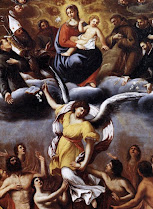[by C. F. W. Walther; Part 4]
… Also in the December issue of Lehre und Wehre last year, he published the conclusion of an article against the Hades doctrine [“X.” listed as the author] of the Romanizing neo-believers [Neugläubigen], that is, against the doctrine that after death men do not immediately go either to hell or to heaven, but to an intermediate place, which they call Hades, where the souls can still do something for their salvation. In it Preuss speaks of the Papists as people who are even worse off with their purgatory than the Romanizing neo-believers, and in so doing he refers to the fact that the doctrine of an intermediate place and intermediate state cannot be accepted simply because it contradicts the pure Lutheran doctrine of justification. For example, he writes on p. 357:
“Papists also try to strengthen their intermediate state with passages like Matt. 5:26 and Matt. 18:34, which are to strengthen their purgatory”.
Whereupon he then shows that these and other passages confirm nothing less than this error, and finally adds p. 361:
“Thus all the pillars have proved to be null and void, so that the intermediate-state theologians tried to support their theory allegedly from the Holy Scriptures. And it remains with the old simple doctrine of our dear Lutheran Church, a doctrine which is in truth witnessed by the Holy Scriptures, even by the New Testament, on almost all its pages.” 5)
On page 362 Preuss also writes:
“The Pope may invent a purgatory. God's Word has no material for it. Our dear Luther has therefore also rejected it, along with other papal imaginings [Fündlein], far from himself.” 5)
Preuss cites abundant testimonies from Luther's writings, among others also p. 364, the passage in which Luther shows that the Papists mainly, for the sake of 2000 drachmas written of in 2 Maccab. 12:43, cling to their doctrine of purgatory. After Preuss had also quoted hymn verses from Lutheran hymn books, which testify that the believers enter heaven for salvation as soon as they die, he concludes his essay on p. 365 with the following words:
“Against the whole singing church as well as against the whole teaching church, the German innovators enter into battle. And if it were only that; but they argue against the Bible itself! For the Scriptures of both Testaments know, as we have seen, only two places where the souls of the dead go, not three or four. Against these scriptural passages those intermediaries violate; and not only against these! Rather, they threaten the pure doctrine of justification itself. 5) For if men after death do not fall into two groups, wretched and saved, neither do they fall into two groups before that. So it does not say before that: before God unjust or just! Thus the blood of Christ does not cleanse from all sins. So too the justification has its stages. — With the late [E. W.] Hengstenberg <column 2> the error has really developed. First in the doctrine of the state of souls after death and then in the doctrine of justification he gave way to truth. His Scheol doctrine, especially with regard to the Old Testament, long before his aberration in that main point, indeed—as much as the writer of these lines knows—was never different from the modern one opposed here. It is dangerous to give up any point of faith even the slightest.”
————————
5) Emphasized by us.
————————
So Dr. Preuss had this printed on December 1, 1871. And on the same day (!!) he submitted in writing his resignation, in which he stated as his reason: because he had “lost the conviction of the correctness of the whole Lutheran doctrine of justification after several months of heavy struggles”! —


No comments:
Post a Comment
Comments only accepted when directly related to the post.